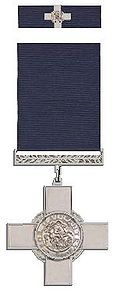Peter Norton (British Army officer): Difference between revisions
Cyberbot II (talk | contribs) Rescuing 1 sources, flagging 0 as dead, and archiving 0 sources. #IABot |
|||
| Line 67: | Line 67: | ||
==External links== |
==External links== |
||
*[http://www.mod.uk/DefenceInternet/DefenceNews/PeopleInDefence/CaptNortonTheStoryBehindTheGeorgeCross.htm Citation and biography from MOD website] |
*[https://web.archive.org/20060324153816/http://www.mod.uk/DefenceInternet/DefenceNews/PeopleInDefence/CaptNortonTheStoryBehindTheGeorgeCross.htm Citation and biography from MOD website] |
||
{{Persondata <!-- Metadata: see [[Wikipedia:Persondata]]. --> |
{{Persondata <!-- Metadata: see [[Wikipedia:Persondata]]. --> |
||
Revision as of 00:47, 17 February 2016
Peter Norton | |
|---|---|
 | |
| Born | 10 December 1962 Edmonton, London |
| Allegiance | |
| Service/ | |
| Years of service | 1983–2013 |
| Rank | Major |
| Service number | 24592939 557344 (after commission) |
| Unit | Royal Logistic Corps |
| Battles/wars | Northern Ireland Iraq War |
| Awards | George Cross FBI Star (United States) |

Major Peter Allen Norton GC (born 10 December 1962)[1] is a retired ammunition technical officer with the British Army's Royal Logistic Corps who was awarded the George Cross for his service in Iraq.
Biography
Norton was born in Edmonton, London,[1] but grew up in Margate, Kent, and joined the Royal Army Ordnance Corps (which later amalgamated into the Royal Logistic Corps) as a private in 1983. He reached the rank of warrant officer class 1 and was appointed a conductor, the most senior non-commissioned appointment in the British Army, before being commissioned as a captain on 8 July 2002.[2] He was promoted to major on 31 July 2008.[3] On 1 August 2013, Norton retired from the army on medical grounds.[4]
George Cross
A captain at the time, he was second-in-command of the American Combined Explosives Exploitation Cell (CEXC) based in the outskirts of Baghdad. Going to the aid of a United States Army patrol that had been attacked by an improvised explosive device (IED) on 24 July 2005, he was checking for the presence of further devices when a secondary victim-operated IED exploded. He lost his left leg and part of his left arm, and he sustained serious injuries to his other leg and lower back. Despite his injuries, he continued to give instructions to his team, suspecting that further devices might be in the vicinity. He refused to be evacuated until he was certain that all personnel on the ground were aware of the danger. A third device was subsequently located and dealt with the following day.
The award was gazetted in a supplement to the London Gazette of 24 March 2006.[5] Since his team contained two special agents of the FBI, Norton was also awarded the FBI Star on 27 March 2009.[6]
Honours and awards
| George Cross (GC) | 2006 | |
| General Service Medal | with 'Northern Ireland' clasp | |
| Iraq Medal | ||
| Queen Elizabeth II Golden Jubilee Medal | 2002 | |
| Queen Elizabeth II Diamond Jubilee Medal | 2012 | |
| Long Service and Good Conduct Medal | ||
| FBI Star | (United States) |
References
- ^ a b "Peter Allen Norton, GC". George Cross database. Archived from the original on 16 November 2007. Retrieved 19 December 2007.
- ^ "No. 56679". The London Gazette (invalid
|supp=(help)). 3 September 2002. - ^ "No. 58786". The London Gazette (invalid
|supp=(help)). 5 August 2008. - ^ "No. 60629". The London Gazette (invalid
|supp=(help)). 17 September 2013. - ^ "No. 57935". The London Gazette (invalid
|supp=(help)). 24 March 2006. - ^ "Presentation of FBI Honorary Medals". 27 March 2009. Retrieved 20 September 2013.
